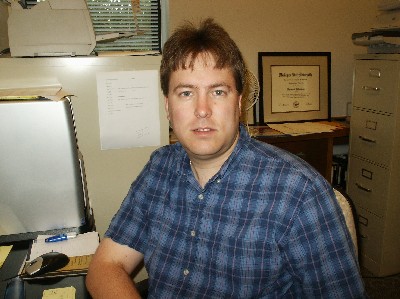Under construction
Douglas J. Beussman

Associate Professor of Chemistry
St. Olaf College
1520
Office phone: 507-786-3429
Fax: 507-786-3968
Email: beussmad@stolaf.edu
Educational Training
Previous
Experiences
Publications
Research Interests
Courses Taught at
Chemistry 106:
Forensic Science (Lecture only)
This course introduces the fundamentals of forensic science. Lectures focus on
how samples are collected and analyzed and what information can be obtained.
Actual case studies will be used to supplement lectures. Topics will include
hair analysis, paint analysis, drug screening, arson investigation, ballistics,
DNA analysis and fingerprint analysis. This course is also available with a
laboratory component, as Chemistry 107.
Chemistry 107:
Forensic Science with Lab
In addition to the in-class experience shared with Chemistry 106 and described
above, this course offers a laboratory component with experiments that feature
the use of forensic techniques to collect and analyze evidence, including
fingerprinting, drug analysis, arson investigation, DNA
fingerprinting and fiber analysis. Students attend three classes and one 3-hour
laboratory per week.
Chemistry 255/256:
Analytical Chemistry (255 - Lecture, 256 - Lab)
Students not only investigate the theory of modern analytical chemistry, but
also examine the statistical treatment of errors, equilibrium, activities,
acid/base chemistry, spectroscopy, electrochemistry and separations. Students
taking this course use computers for solving problems. The accompanying lab
course, Chemistry 256, illustrates the topics discussed in Chemistry 255.
Students enrolled in this lab course practice techniques of modern analytical
chemistry using state-of-the-art instrumentation, including pH meters, liquid
chromatographs and a variety of spectrophotometers. Data acquisition via
computer-interfaced instrumentation and electronic record-keeping is
emphasized. Students practice and develop group skills by working in “companies”
throughout the semester.
Chemistry 378/382:
Instrumental Analysis (378 - Lab, 382 - Lecture)
Students study how instruments function mechanically, mathematically, optically
and electronically and then how the parts are linked together. Topics covered
include basic electronics and computer interfacing, spectrophotometric
instruments, mass spectrometers, electrochemical instrumentation and various
separation methods. Students explore analytical applications, problem solving
and understanding how people and instruments operate together to make things
happen. Laboratory experiments demonstrate how systems of amplifiers detect
signals, how computers acquire, process and display data, how chemical
instrumentation is used to solve problems, and how a lab robot is used to
prepare samples and do analyses.
Chemistry 384: Bioanalytical Chemistry
This course will introduce the fundamentals of bioanalytical
chemistry, the application of modern analysis techniques to biological samples.
Current clinical applications and examples of biological problems will be used
to supplement lecture material. Topics will include biological mass
spectrometry, radiochemical and immunological assays, various forms of
chromatography, gel and capillary electrophoresis, electrochemical analysis and
proteomics. Daily lectures will be closely integrated with laboratory
experiences. Hands-on laboratory experiments will involve using different types
of chromatography to separate biological mixtures in various ways,
1-dimensional and 2-dimensional gel electrophoresis, and ELISA assays. Several
experiments will allow students to use the Chemistry Department’s new electrospray mass spectrometer to identify proteins and
determine the amino acid sequence of peptides.
Chemistry 375: Advanced Laboratory
Students work on special projects during one morning or afternoon of laboratory
per week. Projects may include proteomics-based research using the department's
LC-MS or MALDI-TOF instruments, development of methods for forensic analysis,
or development of lab experiments to be used in Forensic Science Lab,
Analytical Chemistry Lab, Instrumental Analysis Lab, or Bioanalytical
Chemistry Lab. Permission of instructor is required.
Chemistry 398: Independent Research
Students work on special projects during two mornings or afternoons of
laboratory per week. Students may be expected to perform scientific literature
research in the library or from on-line sources and may have reading to do
outside of scheduled lab time. Projects may include proteomics-based research
using the department's LC-MS or MALDI-TOF instruments, development of methods
for forensic analysis, or development of lab experiments to be used in Forensic
Science Lab, Analytical Chemistry Lab, Instrumental Analysis Lab, or Bioanalytical Chemistry Lab. Permission of instructor is
required.
St. Olaf Chemistry Web Page
St. Olaf College Home Page
Other Links of Interest
Last modified: February 5, 2008